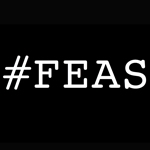My PhD research investigates how Aboriginal women use community radio ‘musicking’ to empower themselves in place and over the airwaves. I developed the project aims in consultation with local Aboriginal leaders in Derby, who participated in my master’s research project on community musicking (conducted between 2016 and 2018). These leaders own and operate 6DBY Larrkardi Radio—the central nexus of music activity in the West Kimberley region—and have witnessed the gradual decline of women’s participation in the West Kimberley Aboriginal music scene since the 1990s. As key stakeholders in my PhD research, they are keen to find ways to revitalise women’s musicking in Derby and across the West Kimberley.

Figure 1. 6DBY Larrkardi Radio in Derby, north Western Australia. All photos by the author.
A crucial first step to inform this process and ensure its viability is to seek out and listen to Aboriginal women across the West Kimberley—radio broadcasters, retired musicians, those who succeeded in their musical careers, and those whose musical aspirations were nipped in the bud—their voices, their stories. The stories of their musical lives may be publicly available, broadcast on the radio (where women’s participation thrives), or in song form; they may also be entirely unspoken and/or unheard. Listening— embodied, feminist, phenomenological— is therefore central to my methodology.
A key concern of the research is what form this listening takes. I often find parallels between my research practice, informed by principles of phenomenology, and the musicking and listening practices of those at the centre of my inquiry. Research shows that music, in comparison to other artistic forms, has a unique capacity to arouse empathic response-ability and thus enable care across cultural and social boundaries. I consider this kind of deep empathic listening to music to be a similar sort of data collection to ethnographic interviews, except unlike interviews, through which trust is gradually established over months and years, listening to original songs is like launching into the deep end of someone’s journal, or their manifesto; something she has been mulling over for long enough to put a melody to it and sing it into life, into the world.
This is the value of music research: our data and methods include musical phenomena and practices, respectively, which enable a depth of engagement with people’s stories that non-musical engagement does not afford. As a feminist, listening and feeling into music by other feminist, LGBTQIA+ women, as well as WOC and Aboriginal women is an embodied practice that cultivates our collective capacities to respond (I have curated a playlist, below, as an example of this). As a researcher, I incorporate these listening practices into my ethnographic approach in order to begin to understand others’ lifeworlds.
There are some limitations to deep listening in the West Kimberley context, however. My subject positioning as white, and, indeed, as a feminist, situate me as an outsider in the conservative West Kimberley region, where Aboriginal people comprise almost two thirds of the population, and where ‘research’ holds exploitative and extractive connotations in living memory. Across the Kimberley, the proper term for white people is gardiya. I was born on the opposite corner of the continent, Wiradjuri country. My fourth and fifth great grandparents’ immigration from the UK to Australia was made possible by colonial claims to land based on the falsehood of terra nullius. This ancestral heritage grants me white race privilege and situates me in a relative position of power. Previous gardiya researchers in the West Kimberley have exploited this power, enhanced by their association with the colonial institution of the university, to exhume and smuggle human remains; any outsider activity under the label of ‘research’ still indexes this extractive colonial history.
Similarly, in the conservative, pastoralist Kimberley context, ‘feminism’ struggles to distance itself from white, middle-class, liberal-arts-educated connotations. Therefore, although intersectional feminisms have provided the foundation for the present research through their cultivation of my practices as a researcher, the way that feminisms will be articulated through the research — i.e., in the context of Aboriginal women’s lived lives —will be on their terms, in their languages, and according to the way various feminisms figure (or don’t figure) within the contexts of their own lifeworlds.

Figure 6. Looking out over Ngarinyin country at Kimberley Downs Station, an hour or so out of Derby. Two Ngarinyin participants in my master’s research were born and raised at this pastoral station and grew up playing country music.
Based on my preliminary research in Derby, I sense that feminism, as I understand it and as it colours my own lifeworld, is seen as less important than good jobs, good schools, land rights, safe housing, and effective policing.Even though current intersectional feminisms hold these issues as central to their cause, framing these issues as explicitly ‘feminist’ could potentially misrepresent the lifeworlds of Aboriginal women, who may instead frame these issues in terms of ‘colonialism’, ‘capitalism’ or ‘sovereignty’.

Figure 7. Driving at the speed limit across the Derby mud flats, which surround the township.
It matters how Aboriginal women frame these issues relative to their lived experience. Feminist listening practices enable a capacity to think- and feel-with these framings. At the same time, incorporating principles of phenomenology into my listening practices requires a willingness to bracket aspects of my own feminist lifeworld in order to really hear Aboriginal women’s stories and voices in high fidelity.
Brigitta created a Spotify playlist for this post, you can listen here: https://open.spotify.com/playlist/660USfNcSl9ADCXnSDXo4N?si=AcwTJgQnQlqK0RnjDm6e4A
References
Clarke, E., T. DeNora and J. Vuoskoski. 2015. ‘Review: Music, Empathy and Cultural Understanding’ Physics of Life Reviews 15: 61–88.
Gabrielsson, J. and W. Thornton. 2007. Dark Science. Film Finance Corporation Australia and Frank Haines Films.
O’Brien, K. 2016. ‘Listening as Activism: The “Sonic Meditations” of Pauline Oliveros’ The New Yorker (online), published 9 Dec, accessed 14 Mar 2021.
Small, C. 1998. Musicking: The Means of Performing and Listening. University Press of New England.
